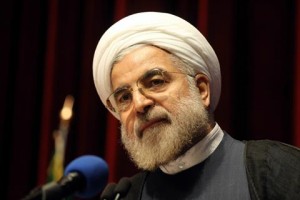 A former U.S. negotiator on resolving the�impasse over Tehran's nuclear program.
A former U.S. negotiator on resolving the�impasse over Tehran's nuclear program.We don't yet know whether Hasan Rouhani's election as president of Iran will improve the prospects for a nuclear deal -- prospects that had dimmed significantly as a result of continued stalemate in the negotiations in the first half of 2013. But if the United States and its partners are to take advantage of whatever opportunity may exist post-election, they need to move quickly to review and adjust their own approach.
There are reasons for thinking the situation may have changed for the better. The election's most encouraging development -- aside from Rouhani's win itself, which was surprisingly decisive -- was that it revealed a deep discontent about the country's hard-line�diplomatic strategy. Although several candidates criticized the "no compromises" approach to talks, which was defended by candidate and chief nuclear negotiator Saeed Jalili, the sharpest rebuke came from Ali Akbar Velayati, former foreign minister and the supreme leader's foreign policy adviser. In the June 7 debate, he said, "When you take three steps and want the other to take one hundred steps, it's clear that you don't want to advance matters." And he concluded that "our current nuclear negotiations definitely have problems; otherwise we would not be in our current situation."
That critique is remarkable for two reasons. First, Velayati and the other critics are drawing a direct connection between Iran's rigid negotiating posture and the deprivations suffered by the Iranian people as a result of sanctions; they are arguing that Iran must adopt a more conciliatory approach if it wants to reverse Iran's downward economic spiral and rebuild its international standing. Second, this assessment comes from regime stalwarts but stands in sharp contrast to what Supreme Leader Khamenei and other hardliners have been saying: that the sanctions, while harsh, can be weathered, that the economic difficulties were caused by Mahmoud Ahmadinejad's mismanagement and can be remedied by a new president, and even that the sanctions are a blessing in disguise because they encourage Iranian self-reliance and reduce dependence on oil revenues.
Ayatollah Khamenei's key negotiating goal -- at least so far -- has been to weaken international support for sanctions and buy time for advancing Iran's nuclear program. His hope seems to have been that the international community would lose interest in sanctions before the sanctions broke the back of Iran's economy, freeing Tehran from having to make concessions that would compromise its nuclear ambitions. The deep divisions exposed during the election suggest that there is strong skepticism within Iran that such a hope can be realized -- and a growing belief that the only way out of Iran's current predicament is to reach an accommodation on the nuclear issue. Sanctions seem to have altered Iranian calculations.
Of course, in the Islamic Republic, the ultimate authority on things nuclear is the supreme leader, and Ayatollah Khamenei is perhaps the regime's most uncompromising ideological opponent of accommodation with the United States and its partners in the so-called P5+1 (China, France, Germany, Russia, and the United Kingdom). But we shouldn't underestimate Rouhani's role. He will be a player on the nuclear issue, much more than Ahmadinejad ever was, not just because of his personal experience as a nuclear negotiator or his mandate from the Iranian electorate, but also because it is now clear that he has allies within the Iranian leadership who support his desire to end the impasse. The supreme leader will continue to be heavily influenced by the Iranian Revolutionary Guard Corps and other opponents of compromise. But he and his close advisors will also have to pay attention to Rouhani.
As Iran reviews its approach, the Obama administration needs to do the same, especially in light of the Iranian election and advances in the Iranian nuclear program.
There will be a natural tendency within the administration to stand pat for now and wait to see whether the new Iranian government will alter its approach when talks resume. Some officials will argue internally that "we should not negotiate with ourselves" by adjusting our position even before we learn whether Iran has decided to adopt a more serious approach. Such caution is understandable, especially given Iran's disappointing track record. But the "other side must go first" approach doesn't take into account the domestic difficulties Rouhani will encounter in formulating a new posture, the likelihood that it will be easier for the new Iranian negotiating team to react to ideas put forward by the United States and its partners than to initiate ideas of its own, or the fact that time and Iran's nuclear program are not standing still.
By Foreign Policy
The Iran Project is not responsible for the content of quoted articles.










